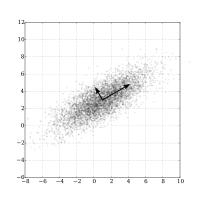
Photo from wikipedia
Hypoxia is known to be a common feature within many types of solid tumors, which is closely related to the limited efficacy of radiotherapy. Meanwhile, due to the non-discriminatory killing… Click to show full abstract
Hypoxia is known to be a common feature within many types of solid tumors, which is closely related to the limited efficacy of radiotherapy. Meanwhile, due to the non-discriminatory killing effect of both normal and cancer cells during the radiation process, traditional radiosensitizers could bring severe non-negligible side-effects to the whole body. In this work, stable and atomically precise Mn clusters which possess efficient pH-triggered catalytic selective capacity are developed rationally. Mn clusters could efficiently catalyze oxygen production in an acidic tumor microenvironment, while exhibiting strong reducibility and free radical scavenging ability in neutral circumstances. In vivo experiments show that Mn clusters are able to enhance the radiotherapy effect in the mouse model of 4T1 tumors and protect normal tissues from radiation at the same time. Thus, the present work provides a novel dual-functional strategy to enhance radiotherapy-induced tumor treatment by improving tumor oxygenation and protect normal tissues from radiation simultaneously.
Journal Title: Nanoscale
Year Published: 2019
Link to full text (if available)
Share on Social Media: Sign Up to like & get
recommendations!